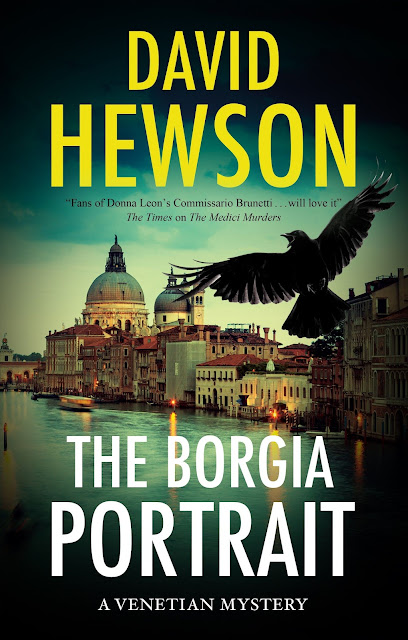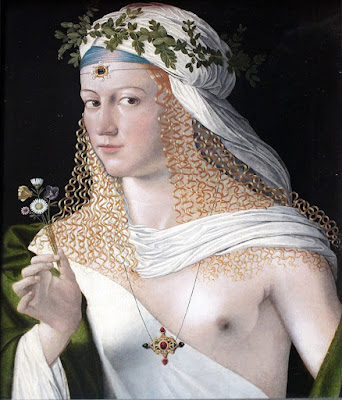DEBORAH CROMBIE: Books are the very best means of armchair travel, and if you have loved Venice, in your imagination or in real life, I have got just the thing for you.
Here's a confession on my part: I have only been to Venice once, a long time ago, on my very first trip to Europe with my parents. But, oh, what an impression it made! I can still see us, drinking Campari and sodas at a cafe table in the Piazza San Marco...
So I'm shouting out a big thank you to David Hewson for taking me there in his new series set in Venice. (And if that cover doesn't make you want to get on plane and go there, you have no romance in your soul!)
But it turns out it wasn't so easy for David to get there, either...
The Borgia Portrait
So how was lockdown for you? Yeah. Join the
club. My entire career as an author has been based around my ability to get out
there and try to squeeze stories out of the real world. Rome, Copenhagen,
Amsterdam, Venice… they’ve all inspired my books over the years.
Then along came Covid and for the first
time in my adult life I found I couldn’t go anywhere, take pictures, seek
inspiration among ancient stones, even talk to people except through the grim
medium of Zoom. No, I was stuck at home in England wondering how on earth I
could find something to write in those circumstances.
Once during 2021 the barriers were briefly
lifted and I could track back to a deserted Venice for a fortnight, though only
if I spent the first five days in solitary quarantine. Then I was home in
lockdown again and thinking… how do I write something in this strange vacuum?
The answer… make a return visit to Venice
in my imagination, and this time in the form of a relatively light-hearted
mystery. An entertainment, a virtual trip to one of the most extraordinary
cities on earth. That first book, The Medici Murders, came out last year
and introduced a most unlikely protagonist, Arnold Clover, a retired archivist,
a modest, intelligent man who aches for a quiet life in his adopted city and
somehow seems unable to find it. In the first book he’s drawn into a mystery
about the real-life assassination of a scion of the famed Medici family in the
sixteenth century. The Borgia Portrait finds him swallowed up by
Venice’s astounding history once more, and struggling to come to terms with
sides of the city he never knew existed.
Most stories begin with a ‘what if?’ This
one harks back to the early sixteenth century and the notorious Borgia clan who
briefly held sway in the Vatican – the father, Rodrigo, as Pope, son Cesare as
his right-hand man, daughter Lucrezia as loving offspring used mercilessly for
marriage bait in Rodrigo’s many schemes. Rumour has it Lucrezia was closer to
both father and son than was proper. I’m not sure about Rodrigo but Cesare
certainly loved his sister very deeply indeed. One real-life slightly risqué
painting that might be her exists, by the Venetian artist Bartolomeo Veneto.
What if Cesare commissioned a more daring
erotic version for his own bedroom? And that painting found its way to one of
Lucrezia’s real-life lovers, the Venetian intellectual and churchman Pietro
Bembo whose palace still stands by the Rialto to this day? And that same
painting later came to fascinate and tempt men who came after, Lord Byron and
the artist Modigliani among them?
Well, there’s my ‘what if?’ Now for
something to do with it. I know… a riddle. The famed portrait is lost somewhere
in Venice in mysterious circumstances following the disappearance and presumed
death of its last owner. A young, impoverished Englishwoman is due to inherit
it, if only she can find the thing. And to do that she – and Arnold – need to
unravel a cryptic riddle left in the form of a forged entry from the diary of
that notorious Venetian Casanova.
There’s the heart of this story. Arnold and
his new friend Lizzie Hawker need to locate eight places in Venice that will
lead them to the elusive Lucrezia. All but one of them real. All but one of
them obscure, hidden, strange, occasionally creepy, and never found by the
hordes of tourists crowding San Marco and the Rialto.
I was, thank goodness, able to visit Venice
relatively freely for the vast amount of research this book required. What I
hope I’ve created is a sophisticated entertainment that will transport readers
to this amazing place in the lagoon, there to enjoy a light-hearted tale of
history, culture, mystery, and a fair smattering of food too as Arnold and Lizzie
set out on their quest.
The best way for me to escape the dreary
misery of lockdown was to lighten up, even if only in my own head, and try to
deliver a tale that was amusing, perhaps a little educational, and mostly
swayed away from the dark. I hope it’s as much fun to read as it was to write.
DEBS: Oh, the food David describes in these books is mouthwatering! And Arnold Clover is my new favorite amateur detective. Now I just need to sign up for Italian lessons..
READERS, where was your favorite place to armchair travel during lockdown?
































